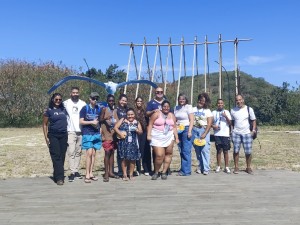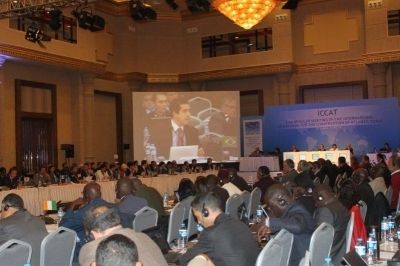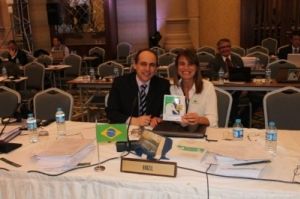Confira declaração oficial do Brasil no XXII Encontro do ICCAT
Leia a declaração oficial da delegação brasileira presente ao XXII Encontro da Comissão Internacional para a Conservação do Atum no Atlântico (ICCAT). O encontro é realizado em Istambul, na Turquia, até o dia 19 e reúne especialistas para também discutir a captura incidental de aves marinhas por barcos de pesca em todo o mundo. O documento destaca a preocupação brasileira em relação a esse assunto. A delegação - da qual faz parte Tatiana Neves, coordenadora geral do Projeto Albatroz - é chefiada por Fábio Pitaluga, chefe da Divisão do Mar, da Antártica e do Espaço, do Ministério das Relações Exteriores.
Mr. Chairman,
It is a great pleasure for the Brazilian delegation to participate in the XXII Regular Meeting of the International Commission for the Conservation of Atlantic Tunas, for the second time being held in Turkey, this turn in the historical and millenary Istanbul. We would like to thank Turkey for the excellent organization of this event and for the warm hospitality of the Turkish people.
On behalf of the Brazilian Government and people, the Brazilian delegation expresses its solidarity and its most sincere condolences to the Government and people of the Republic of Turkey on the human losses caused by the two recent terrible earthquakes that struck the Province of Van, causing hundreds of deaths and destruction in the eastern area of the country.
We would like to thank the European Union for its support for the meeting. We also wish to recognize and praise the hard work done by the Executive Secretary and the Secretariat staff in the very competent preparation for this event.
Let us also take this opportunity, Mr. Chairman, to congratulate you for the closure of your second and last term as the Chairman of the Commission. During your tenure, Mr. Chairman, this Commission undoubtedly achieved an unprecedented progress, towards ensuring the sustainability of the tuna fisheries in the Atlantic Ocean and the Mediterranean Sea. We are very glad to realize, Mr. Chairman, that under your leadership, along the past four years, ICCAT realized the importance of full respect for scientific advice, observance of the precautionary approach and marked improvements with regard to the implementation of the ecosystem approach to fisheries management. That is clearly reflected in several recommendations adopted during this period devoted to the protection of bycatch species, such as sharks, turtles and seabirds. The unparalleled progress this Commission attained in the past four years certainly put it in the forefront among fisheries management organization in terms of responsible fisheries.
PLE-120
Mr. Chairman, Brazil is also pleased to take this opportunity to reaffirm its commitment to the duly implementation of all management and conservation measures adopted by ICCAT, as well as to the sustainability of tuna fishery in the Atlantic Ocean. In recent years, Brazil has achieved a significant progress in the management of fishing activities, including by improved Monitoring, Control and Surveillance.
In 2003, Brazil created the Secretariat of Fisheries and Aquaculture, aiming at improving the national fisheries policy. Due to the success achieved by the Secretariat, in 2009, it was upgraded to a full Ministry rank, a fact that clearly emphasizes the high hopes and expectations of the Brazilian people for the development and better control of the fisheries sector.
The establishment of the Ministry of Fisheries and Aquaculture has resulted in the improvement of the Brazilian fisheries statistics as well as in the development of strategic programs for the control of fishing activities, such as the on board observer program (PROBORDO) and the vessel monitoring system (PREPS). The new Ministry also coordinates and implements, in conjunction with the Ministry for the Environment, a joint committee for the management of fisheries resources, responsible for adopting the necessary regulations, with a view to harmonize the development of the fisheries sector, with the necessary sustainability and fulfillment of international commitments.
Once again, Mr. Chairman, this year is going to be a very busy year for ICCAT. Although there will be no negotiation of new TAC or quotas for the bluefin tuna, a species which in previous meetings consumed a significant amount of time, there are several species that will require a particular attention of the Commission, including the North Atlantic and Mediterranean swordfish, South Atlantic and Mediterranean albacore, bigeye tuna, yellowfin tuna, blue and white marlins, sailfish, sharks, particularly the silky shark, and seabirds.
Brazil fully supports the evident need to adopt TACs or catch limits in full conformity with SCRS advice for all target species, in conjunction with sharing arrangements capable of preventing their overshooting. Another issue that is very important to the Brazilian delegation during this meeting, Mr. Chairman, is the urgent need to further reduce the by-catch in all fisheries for tuna and tuna-like species.
In that context, we hope that the Commission will be able to extend the present recommendation on billfish, prohibiting, however, the landings of blue marlin from pelagic longline and purse seine fisheries, as recommended by the SCRS, and extending the prohibition of retention,
now applicable to the oceanic whitetip and the bigeye tresher shark, to the silky shark as well. As also noted by the SCRS, the silky shark was considered one of the most vulnerable species in the Ecological Risk Assessment conducted in 2008, requiring, therefore, immediate and urgent protection, similar to the measures already adopted for the two other shark species mentioned. We also believe, Mr. Chairman, that time has come to further improve the management measures now in place to reduce the bycatch of seabirds and we will diligently work with other delegations to that aim.
We are also very hopeful, Mr. Chairman, that during this meeting we can clarify and renew the Terms of Reference of the Working Group on the Future of ICCAT, so that it can effectively engage in the much needed exercise of updating the ICCAT Convention, in order to align it with the modern concepts of fisheries management. In our view, Mr. Chairman, such exercise does not require a complete redrafting of the Convention. On the contrary, we favor the approval of precise and very well focused terms of reference, to address specific issues such as the Precautionary Approach, the Ecosystem Approach, the Objection Procedures, and the decision-making process, in particular the time for adopted measures to enter into force and voting rules, including required quorum.
We greatly welcome the document from STACFAD Chair to facilitate the participation of developing countries in the meetings of the Commission and strongly encourage Contracting Parties to expand and strengthen ICCAT capacity building initiatives.
Finally, Mr. Chairman, we would like to reaffirm the disposition of the Brazilian delegation to fully cooperate with you and with all delegations to make this meeting a very successful one.
Leia mais
+ Notícias

Centro de Visitação do Projeto Albatroz recebe a p...
Associação voltada ao público autista conheceu as riquezas da Lagoa de Araruama, além de espaços lúd...
13/02/2026
13/02/2026 Leia mais
Conquista ambiental: Projeto Albatroz participa do...
Reconhecimento internacional de gestão ambiental costeira reforça a importância da sustentabilidade ...
08/01/2026
08/01/2026 Leia mais







